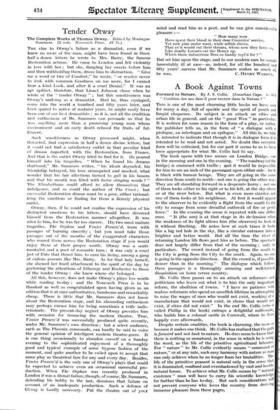Tender Otway
The Complete Works of Thomas Otway. Edited by Montague Summers. (3 vols. Nonesuch Press. E2 2s.)
THE clue to Otway's failure as a dramatist, even if we knew no more of the man, might have been found in those half a dozen letters he wrote to Mrs. Barry, the famous Restoration actress. He came to London and fell violently in love with her ; but she, dangling her sweets before him and then withholding them, drove him to distraction. "Give me a word or two of Comfort," he wrote, "or resolve never to look with common Goodness on me more, for I cannot bear a kind Look, and after it a cruel Denial." It was an apt epithet, therefore, that Lionel Johnson chose when he wrote of the tender Otway" ; but this sensitiveness was Otway's undoing as a dramatist. Had he, thus equipped, come into the world a hundred and fifty years later, and been spared to arrive at maturer years, be might easily have been one of our best dramatists ; as it is, not all the erudition and enthusiasm of Mr. Summers can persuade us that he was anything more than a promising young man whom environment and an early death refused the fruits of ful- filment.
Such sensitiveness as Otway possessed might, when thwarted, find expression in half a dozen divine letters, but it could not find a satisfactory outlet in that peculiar kind of drama imported, with the Restoration, from France. And that is the outlet Otway tried to find for it. He poured himself into his tragedies. "When he found his dreams shattered," Mr. Summers writes, "his ideals degraded, his friendship betrayed, his love strumpeted and mocked, what wonder that his fair affections turned to gall in his bosom and that his mouth was filled with fierce stinging words ? " The Elizabethans could afford to allow themselves that indulgence, and so could the author of The Cenci; but successful Restoration drama must be a pose, either rational- izing the emotions or finding for them a fiercely physical outlet.
Otway, then, if he could not confine the expression of his distracted emotions to his letters, should have divorced himself from the Restoration manner altogether. It was alien to him, for he was far too sincere. His two most mature tragedies, The Orphan and Venice Presered, teem with passages of burning sincerity ; but you must take those passages out of the mouths of the exaggerated characters who roared them across the Restoration stage if you would enjoy them at their proper worth. Otway was a senti- mentalist and a poet of romantic turn : it was only a cruel jest of Fate that thrust him, to earn his living, among a gang of callous poseurs like Mrs. Barry. As for that lady herself, she showed her fixed attachment to the spirit of the day by preferring the attentions of Etherege and Rochester to those of the tender Otway : she knew where she belonged. .
All this, however, does not Make Otway's plays less worth while reading to-day ; and the Nonesuch Press is to be thanked as well as congratulated upon having given us an edition that is at once authoritative, handsome and remarkably cheap. There is little that Mr. Summers does not know about the Restoration stage, and his abounding enthusiasth may perhaps excuse him for being sometimes a trifle indis- criminate. The present-day neglect of Otway provides him with occasion for trouncing the modern theatre. True, Venice Preserv'd was successfully produced quite recently, under Mr. Summers's own direction ; but a select audience, such as The Phoenix commands, can hardly be said to voice the general opinion of intelligent modern theatre-goers. It is one thing occasionally to abandon. oneself on a Sunday evening to the sophisticated enjoyment of a thoroughly good and typical example of some bygone fashion of the moment, and quite another to be called upon to accept that same play as theatrical fare for any and every day. Besides, Venice Preserv'd is the only one of Otway's plays that could be expected to achieve even an occasional successful pro- duction. When The Orphan was recently produced in London it was a dismal failure, though, of course, Mr. Summers, defending his hobby to the last, dismisses that failure on account of an inadequate production. Such a defence of Otway is hardly necessary. Put the theatre out of your
mind and read him as a poet, and he can give considerable pleasure :— " How many men Have srent their blood in their dear Countries' service, Yet now pine under want, while selfish slaves, That ev'n would cut their throats, whom now they fawn on, Like deadly Locusts eat the Honey up, Which those industrious Bees so hardly toyfd for ? "
But set him upon the stage, and to our modern ears he sounds lamentably ill at ease—as, indeed, for all the hundred and fifty years' success that Mr. Summers makes so much of






























































 Previous page
Previous page